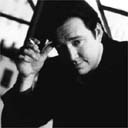
American Scream: The Bill Hicks Story by Cynthia True 252pp, Sidgwick & Jackson, £9.99
We have never needed Bill Hicks more than we do today. His radical stand-up comedy asked American audiences to confront "why the rest of the world hates us", and his video, Relentless , ends with Hicks posing against a burning stars and stripes. He rather accurately described himself as "Noam Chomsky with dick jokes", and Reagan as "a virus in shoes". He lamented the fact that while John Lennon was killed by a gunman, the president was only wounded.
But Hicks isn't around to give us his take on the war on terror: he died of pancreatic cancer eight years ago, at the age of 32. Cynthia True's intelligent and tightly researched biography, however, goes some way to helping us imagine the colour and texture of the bile Hicks would doubtless be hacking forth if he were still with us.
Hicks was the US Christian right's worst nightmare: a photographic negative of bible-thumping preachers like Pat Robertson and Jerry Falwell. Where they lauded family values, he savaged them ("they obviously didn't know my family"); where they revered Christ, he joked about him. "A lot of Christians wear crosses around their necks," he observed. "Nice sentiment, but do you think when he comes back he's really going to want to look at another cross?"
Just like the moral majority, Hicks believed he was engaged in a culture war between good and evil, except for him the sides were flipped. On the side of the angels stood Lennon, Jimi Hendrix and Keith Richards; evil was represented by Falwell and bland "personalities" like George Michael and Tiffany ("to think somebody could use a good liver").
His obsession with this theme is unsurprising, given that he grew in the same soil as US evangelism. He was raised in the deep south, the son of two baptists. He always felt like an alien in this environment. "It was weird, man," he explained. "My family's always been like strangers to me." He began to idolise TV stand-ups, who were for him like figures from another world. Woody Allen and Richard Pryor were particular obsessions.
The young comedian aggressively questioned the values of the small-town America he grew up in. He raged against what True calls "this philosophy of life where you got married, moved to the suburbs, set the thermostat at 68 degrees, expressed your creativity through your yard work and played the same song on the piano for 30 years".
Hicks's burning impatience with life suggests that at some unconscious level he anticipated his early death. Even in his mid-20s - five years before his cancer was diagnosed - he told friends he was "running out of time". He was also impatient for different and extreme experiences. In his early 20s he became a big fan of hallucinogens, and gave memorable performances while on acid.
Like Lenny Bruce before him, Hicks exposed the very limited boundaries within which US political dialogue takes place. He had constitutionally guaranteed freedom of speech, but he was denied a platform from which to express this mythical freedom. A brilliant routine taped for the David Letterman show (that supposedly iconoclastic showcase for comedy talent) was never broadcast because he joked about Christianity and the pro-life movement. Hicks said, "If you're so pro-life, do me a favour - don't lock arms and block medical clinics. Lock arms and block cemeteries." For this he was exiled from the US airwaves.
The ultimate insult to Hicks's acerbic temperament would be to turn his life story into a TV-movie weepie, with the bitter left-wing stand-up finding love and peace on his deathbed. Where a lesser biographer might have steered lazily on to this territory, True holds back. She admits in her introduction that "it is tempting to read his story as a tragedy", but shows that in fact Hicks's life was a quiet triumph. His posthumous influence has been massive. It is impossible to watch Mark Thomas or Denis Leary without thinking of Hicks.
True tells us that Hicks imagined that his hero, Jimi Hendrix, didn't die but was reclaimed by his alien brothers, who had dropped off the baby Hendrix in a spaceship. "We'll pick you up in 28 years," they told him. "Jimi, show 'em how it's done." Perhaps that gag can, along with the transformation in stand-up that he wrought, form Hicks's epitaph.

